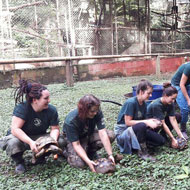
Turtles and tortoises were illegally kept and sold as pets
A new initiative to return trafficked exotic animals to the wild has begun with the release of 79 turtles and 10 tortoise in the Peruvian Amazon.
Most of the yellow-spotted river turtles, which are classed as ‘vulnerable’, were seized from traders who kept them illegally in tubs, buckets or fish tanks. They were sold as pets to members of the public who were wrongly advised that the species is easy to care for.
All 89 animals were rehabilitated at establishments in Lima over a period of months, before being released at the Taricaya Ecological Reserve near Puerto Maldonado.
The successful release was organised by Animal Defenders International (ADI), government authorities ATFFS Lima, the regional government of Madres de Dios and organisations IRUPA, UPA and Animal Voice. It is expected to be the first of many, helping to ensure the future survival of the species.
ADI president Jan Creamer said: “It is such a joy to see these animals go back to the wild where they belong. A life of captivity is no life for a wild animal, and we look forward to returning many more to the habitats from which they were torn.”
IRUPA coordinator and vet Milagros Ramos, who helped to care for the turtles, added: “This is a new beginning and it is immensely satisfying to know that we can rehabilitate more turtles and tortoises, giving these neglected species the attention they deserve.”
Image © ADI



 The RCVS has announced a new version of its 1CPD mobile app, with enhanced features for veterinary surgeons and veterinary nurses to record their continuing professional development.
The RCVS has announced a new version of its 1CPD mobile app, with enhanced features for veterinary surgeons and veterinary nurses to record their continuing professional development.